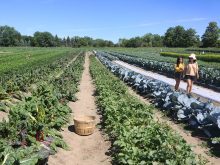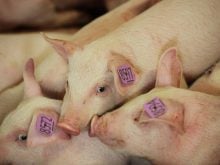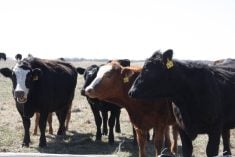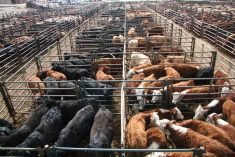OKOTOKS, Alta. – A rich fragrance drifts through every corner of Joanne Burns’s home.
Burns is a soap maker who combines a variety of essential oils, vegetable oils and goats’ milk to produce a handmade product gentle enough for a baby’s skin.
Soap production was not the intention when she and her husband Rob first brought a couple of Nubian goats to their farm south of Calgary.
Burns bred and showed Boxer dogs and found goat milk was ideal for puppies who needed an easy-to-digest supplement. She now has 35 Nubian dairy goats and no show dogs.
Read Also

Canada told trade crisis solutions in its hands
Canadians and Canadian exporters need to accept that the old rules of trade are over, and open access to the U.S. market may also be over, says the chief financial correspondent for CTV News.
The soap making started because she had surplus milk. She was interested in natural products and aromatherapy, and so developed a special soap formula blending the milk with essential oils and vegetable oils.
“The goat milk makes it very mild and moisturizing and creamy.”
The soap lathers well and lasts a long time. Because the soap is mild and contains no additives, it is soothing for people with skin conditions.
“A lot of those stories are really rewarding for me. I really enjoy hearing them,” she said.
The soaps come in a variety of blends like lavender, grapefruit, spice and anise. She also makes fragrance-free soaps for babies.
All the cakes are hand wrapped and carry her logo of a single leaf and the name The Soap Garden on the label.
Burns meant this to be a retirement project but every day is full. Like any dairy, the animals must be milked twice a day. Soap is made three days a week and during the farmer’s market season, she is away every weekend selling soap, lotion and lip balms.
Burns tries to make most of her products during the first part of the year because farmers markets start in June and end with craft fairs leading up to Christmas.
A major sales breakthrough for her was gaining admittance to the Millarville Farmers’ Market, which is a stellar show for crafters and natural product vendors. It caters to a broad, well-to-do clientele eager to try new products.
She is not interested in selling the products wholesale to retailers. She does not want to increase her production much beyond what she can handle alone. The soap is sold through a Calgary pet store, Barking Lot, at farmers’ markets and an outlet in Nanton.
“With word-of-mouth advertising I have all I can keep up with. I don’t want to be huge.”
Burns started by producing about 2.3 kilograms of soap per day in 85 and 140 gram cakes.
She now makes up to 13 kg of soap per session. Her husband built a workshop in their basement that provides her with plenty of room, efficient cutters and drawers for the soap to cure. The soap needs to cure for about three weeks. The longer, the better.
Using a cold process that requires low heat, she carefully melts essential oils, coconut butter and palm oil. Everything must be weighed accurately to ensure the liquid sets. It requires perfect timing when adding the sodium hydroxide and milk. It is carefully stirred with a big whisk to avoid adding air to the mix.
Burns uses essential oils rather than fragrance oils. Some customers are allergic to fragrance oils that can include man-made chemicals.
“I would love to make a vanilla soap but I can’t because that is a fragrance oil,” she said. If she used vanilla or almond essential oils, the cost of a bar of soap would be prohibitive.
The goats demand an equal amount of attention.
Nubian goats are easy to handle, friendly and curious. Extra bucks are sold for meat and the does are sold for purebred breeding stock. The Burnses have exported across Canada and as far away as Brazil.
“People have to be aware that when they get goats, they multiply like rabbits. And triplets and quads are not out of the ordinary. Twins are the norm,” she said. One of her does produced five kids and all lived.
The goats are tested by ultrasound before giving birth so she knows how many might be born. Some of the does get extra care if necessary.
Goats are increasing in popularity because they are small and easy to handle on a small farm. Buyers also need to beware.
“Breeders getting started with goats need to be aware of herd health. They can buy them at the auction, but you can never know if you are getting someone else’s headaches,” Burns said.

















